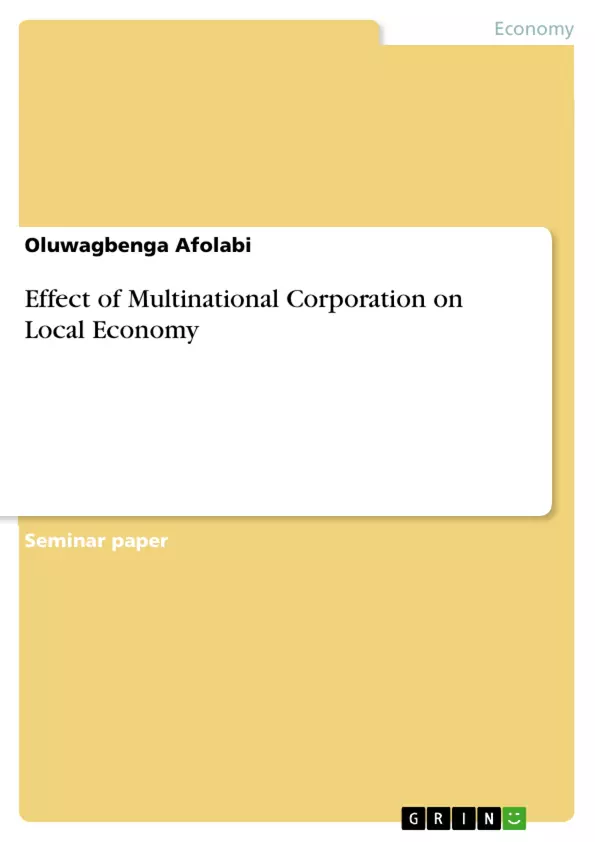The purpose of this paper is to glimpse into the effect Foreign Direct Investment (FDI) on the Host economy. The effect FDI has on the host economy has ranged from technology transfer and know-how, integration in global market formation of human resources, increase in competition between firms and firm’s development and reorganization to meet current market trend. There has also been some adverse effect brought about by Foreign Direct Investment. This paper tends to take a look at both the positive and negative impact of FDI on host economy development.
Table of Contents
- Abstract
- Introduction
- FDI impact on economic growth
- FDI and Technological Transfer
- Employment and Foreign Direct Investment
- FDI contribution to capital inflow of private capital.
- Adverse effects of FDI on the local Environment..
- FDI Influence on Exchange Rates
- FDI and Unemployment.
- FDI and Modern-Day Economic Colonialism.
- Summary
- References.
Objectives and Key Themes
This paper examines the effects of Foreign Direct Investment (FDI) on the host economy, considering both the positive and negative impacts. The study aims to shed light on how FDI contributes to economic growth, technology transfer, employment creation, and capital inflow, while also exploring potential drawbacks such as environmental degradation, exchange rate fluctuations, and unemployment.
- Impact of FDI on economic growth through factor accumulation and total factor productivity
- Role of FDI in technology transfer and knowledge spillovers
- Benefits and challenges of FDI in creating employment opportunities
- Contribution of FDI to capital inflow and private capital investment
- Potential negative consequences of FDI, including environmental impact and job displacement
Chapter Summaries
- Introduction: This chapter defines Foreign Direct Investment (FDI) and highlights its importance as an engine for sustainable economic growth. It discusses the different forms of FDI, such as partial ownership, joint ventures, and greenfield investments. The chapter also explores the factors that influence a firm's decision to invest in a foreign country, including political stability, access to raw materials, and cultural considerations.
- FDI Impact on Economic Growth: This chapter delves into the impact of FDI on economic growth, explaining the concepts of factor accumulation and total factor productivity (TFP). It discusses how FDI can contribute to economic growth by increasing the productivity of factors of production. Examples of the impact of US investments in China are provided to illustrate the relationship between FDI and economic growth.
- FDI and Technological Transfer: This chapter examines the role of FDI in technological transfer and knowledge spillovers. It highlights how FDI can facilitate technological advancement in developing countries, enabling them to close the gap with developed economies. The chapter uses China's open-door policy and its experience with multinational subsidiaries as an example of FDI's contribution to technological advancement.
Keywords
The primary keywords and focus topics of this paper are: Foreign Direct Investment (FDI), host economy, economic growth, technological transfer, employment, capital inflow, environmental impact, exchange rates, unemployment, and economic colonialism.
Frequently Asked Questions
What is the primary focus of this paper on FDI?
The paper examines both the positive and negative effects of Foreign Direct Investment (FDI) on the host economy of a country.
What are the positive impacts of FDI mentioned?
Positive effects include technology transfer, knowledge spillovers, capital inflow, employment creation, and increased competition leading to firm development.
Does FDI have any negative consequences for the host country?
Yes, the paper discusses adverse effects such as environmental degradation, job displacement, impacts on exchange rates, and the risk of modern-day economic colonialism.
How does FDI contribute to technological advancement?
FDI facilitates technology transfer from developed to developing countries, often through multinational subsidiaries, as seen in China’s open-door policy.
What factors influence a firm's decision to invest abroad?
Key factors include political stability, access to raw materials, cultural considerations, and the potential for sustainable economic growth.
- Arbeit zitieren
- Oluwagbenga Afolabi (Autor:in), 2017, Effect of Multinational Corporation on Local Economy, München, GRIN Verlag, https://www.grin.com/document/426959



